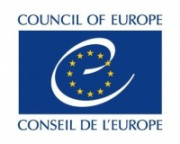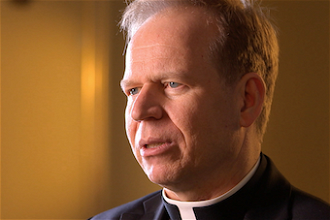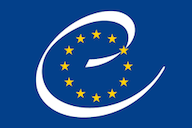Pope Francis: Address to the Council of Europe - full text

Pope Francis called on Europe’s leaders to work diligently and continuously for creative solutions to divisions and conflict for a peaceful continent. In a wide-ranging speech to the Council of Europe in Strasbourg today, Pope Francis observed that “peace continues all too often to be violated” in many parts of the world where conflicts “continue to fester.” Tensions also continue to exist on the European continent, the Pope noted, which “yearns for peace but which so easily falls back into the temptations of the past.”
The Pope observed that the Council of Europe was established in 1949, on the heels of two world wars, with the dream “to rebuild Europe in a spirit of mutual service which today too, in a world prone to make demands than to serve, must be the cornerstone of the Council of Europe’s mission on behalf of peace, freedom and human dignity.”
He urged European leaders to pursue this dream in favour of the common good.
The Council of Europe is an advisory rather than a legislative body comprising 47 member states and representing some 820 million citizens. Also home to the European Court of Human Rights, the Council of Europe provides a venue for cooperation between member states on the basis of common values and common political decisions.
The full text of Pope Francis’ address to the Council of Europe follows:
Mr Secretary General,
Madame President
Your Excellencies,
Ladies and Gentlemen,
I am happy to address this solemn session which brings together a significant representation of the Parliamentary Assembly of the Council of Europe, representatives of member States, the Judges of the European Court of Human Rights as well as the members of the various institutions which make up the Council of Europe. Practically all of Europe is present in this hall, with its peoples, its languages, its cultural and religious expressions, all of which constitute the richness of this continent. I am especially grateful to the Secretary General of the Council of Europe, Mr Thorbjørn Jagland, for his gracious invitation and for his kind words of welcome. I greet Madame Anne Brasseur, President of the Parliamentary Assembly. To all of you I offer my heartfelt thanks for your work and for your contribution to peace in Europe through the promotion of democracy, human rights and the rule of law.
This year the Council of Europe celebrates its sixty-fifth anniversary. It was the intention of its founders that the Council would respond to a yearning for unity which, from antiquity, has characterized the life of the continent. Frequently, however, in the course of the centuries, the pretension to power has led to the dominance of particularist movements. We need but consider the fact that, ten years before the Treaty instituting the Council of Europe was signed in London (5 May 1949), there broke out the most lethal and destructive conflict in the memory of these lands. The divisions it created long continued, as the so-called Iron Curtain split the continent into two, from the Baltic Sea to the Gulf of Trieste. The dream of the founders was to rebuild Europe in a spirit of mutual service which today too, in a world more prone to make demands than to serve, must be the cornerstone of the Council of Europe’s mission on behalf of peace, freedom and human dignity.
The royal road to peace – and to avoiding a repetition of what occurred in the two World Wars of the last century – is to see others not as enemies to be opposed but as brothers and sisters to be embraced. This entails an ongoing process which may never be considered fully completed. This is precisely what the founders grasped. They understood that peace was a good which must continually be attained, one which calls for constant vigilance. They realized that wars arise from the effort to occupy spaces, to crystallize processes and to attempt to halt them. Instead, the founders sought peace, which can be achieved only when we are constantly open to initiating processes and carrying them forward.
Consequently, the founders voiced their desire to advance slowly but surely with the passage of time, since is it is precisely time which governs spaces, illumines them and makes them links in a constantly expanding chain, with no possibility of return. Building peace calls for giving priority to actions which generate new processes in society and engage other persons and groups, who can then develop them to the point where they bear fruit in significant historical events.
That is why the founders established this body as a permanent institution. Pope Paul VI, several years later, had occasion to observe that “the institutions which in the juridical order and in international society have the task and merit of proclaiming and preserving peace, will attain their lofty goal only if they remain continually active, if they are capable of creating peace, making peace, at every moment”. What is called for is a constant work of humanization, for “it is not enough to contain wars, to suspend conflicts… An imposed peace, a utilitarian and provisional peace, is not enough. Progress must be made towards a peace which is loved, free and fraternal, founded, that is, on a reconciliation of hearts”; in other words, to encourage processes calmly, yet with clear convictions and tenacity.
Achieving the good of peace first calls for educating to peace, banishing a culture of conflict aimed at fear of others, marginalizing those who think or live differently than ourselves. It is true that conflict cannot be ignored or concealed; it has to be faced. But if it paralyzes us, we lose perspective, our horizons shrink and we grasp only a part of reality. When we fail to move forward in a situation of conflict, we lose our sense of the profound unity of reality, we halt history and we become enmeshed in useless disputes.
Tragically, peace continues all too often to be violated. This is the case in so many parts of the world where conflicts of various sorts continue to fester. It is also the case here in Europe, where tensions continue to exist. How great a toll of suffering and death is still being exacted on this continent, which yearns for peace yet so easily falls back into the temptations of the past! That is why the efforts of the Council of Europe to seek a political solution to current crises is so significant and encouraging.
Yet peace is also put to the test by other forms of conflict, such as religious and international terrorism, which displays deep disdain for human life and indiscriminately reaps innocent victims. This phenomenon is unfortunately bankrolled by a frequently unchecked traffic in weapons. The Church is convinced that “the arms race is one of the greatest curses on the human race and the harm it inflicts on the poor is more than can be endured”. Peace is also violated by trafficking in human beings, the new slavery of our age, which turns persons into merchandise for trade and deprives its victims of all dignity. Not infrequently we see how interconnected these phenomena are. The Council of Europe, through its Committees and Expert Groups, has an important and significant role to play in combating these forms of inhumanity.
This being said, peace is not merely the absence of war, conflicts and tensions. In the Christian vision, peace is at once a gift of God and the fruit of free and reasonable human acts aimed at pursuing the common good in truth and love. “This rational and moral order is based on a conscientious decision by men and women to seek harmony in their mutual relationships, with respect for justice for everyone”.
How then do we pursue the ambitious goal of peace?
The path chosen by the Council of Europe is above all that of promoting human rights, together with the growth of democracy and the rule of law. This is a particularly valuable undertaking, with significant ethical and social implications, since the development of our societies and their peaceful future coexistence depends on a correct understanding of these terms and constant reflection on them. This reflection is one of the great contributions which Europe has offered, and continues to offer, to the entire world.
In your presence today, then, I feel obliged to stress the importance of Europe’s continuing responsibility to contribute to the cultural development of humanity. I would like to do so by using an image drawn from a twentieth-century Italian poet, Clemente Rebora. In one of his poems, Rebora describes a poplar tree, its branches reaching up to the sky, buffeted by the wind, while its trunk remains firmly planted on deep roots sinking into the earth. In a certain sense, we can consider Europe in the light of this image.
Throughout its history, Europe has always reached for the heights, aiming at new and ambitious goals, driven by an insatiable thirst for knowledge, development, progress, peace and unity. But the advance of thought, culture, and scientific discovery is entirely due to the solidity of the trunk and the depth of the roots which nourish it. Once those roots are lost, the trunk slowly withers from within and the branches – once flourishing and erect – bow to the earth and fall. This is perhaps among the most baffling paradoxes for a narrowly scientific mentality: in order to progress towards the future we need the past, we need profound roots. We also need the courage not to flee from the present and its challenges. We need memory, courage, a sound and humane utopian vision.
Rebora notes, on the one hand, that “the trunk sinks its roots where it is most true”. The roots are nourished by truth, which is the sustenance, the vital lymph, of any society which would be truly free, human and fraternal. On the other hand, truth appeals to conscience, which cannot be reduced to a form of conditioning. Conscience is capable of recognizing its own dignity and being open to the absolute; it thus gives rise to fundamental decisions guided by the pursuit of the good, for others and for one’s self; it is itself the locus of responsible freedom.
It also needs to be kept in mind that apart from the pursuit of truth, each individual becomes the criterion for measuring himself and his own actions. The way is thus opened to a subjectivistic assertion of rights, so that the concept of human rights, which has an intrinsically universal import, is replaced by an individualistic conception of rights. This leads to an effective lack of concern for others and favours that globalization of indifference born of selfishness, the result of a conception of man incapable of embracing the truth and living an authentic social dimension.
This kind of individualism leads to human impoverishment and cultural aridity, since it effectively cuts off the nourishing roots on which the tree grows. Indifferent individualism leads to the cult of opulence reflected in the throwaway culture all around us. We have a surfeit of unnecessary things, but we no longer have the capacity to build authentic human relationships marked by truth and mutual respect. And so today we are presented with the image of a Europe which is hurt, not only by its many past ordeals, but also by present-day crises which it no longer seems capable of facing with its former vitality and energy; a Europe which is a bit tired and pessimistic, which feels besieged by events and winds of change coming from other continents.
To Europe we can put the question: “Where is your vigour? Where is that idealism which inspired and ennobled your history? Where is your spirit of curiosity and enterprise? Where is your thirst for truth, a thirst which hitherto you have passionately shared with the world?
The future of the continent will depend on the answer to these questions. Returning to Rebora’s image of the tree, a trunk without roots can continue to have the appearance of life, even as it grows hollow within and eventually dies. Europe should reflect on whether its immense human, artistic, technical, social, political, economic and religious patrimony is simply an artefact of the past, or whether it is still capable of inspiring culture and displaying its treasures to mankind as a whole. In providing an answer to this question, the Council of Europe with its institutions has a role of primary importance.
I think particularly of the role of the European Court of Human Rights, which in some way represents the conscience of Europe with regard to those rights. I express my hope that this conscience will continue to mature, not through a simple consensus between parties, but as the result of efforts to build on those deep roots which are the bases on which the founders of contemporary Europe determined to build.
These roots need to be sought, found and maintained by a daily exercise of memory, for they represent the genetic patrimony of Europe. At the same time there are present challenges facing the continent. These summon us to continual creativity in ensuring that the roots continue to bear fruit today and in the realization of our vision for the future. Allow me to mention only two aspects of this vision: the challenge of multipolarity and the challenge of transversality.
The history of Europe might lead us to think somewhat naïvely of the continent as bipolar, or at most tripolar (as in the ancient conception of Rome-Byzantium-Moscow), and thus to interpret the present and to look to the future on the basis of this schema, which is a simplification born of pretentions to power.
But this is not the case today, and we can legitimately speak of a “multipolar” Europe. Its tensions – whether constructive or divisive – are situated between multiple cultural, religious and political poles. Europe today confronts the challenge of creatively “globalizing” this multipolarity. Nor are cultures necessarily identified with individual countries: some countries have a variety of cultures and some cultures are expressed in a variety of countries. The same holds true for political, religious, and social aggregations.
Creatively globalizing multipolarity calls for striving to create a constructive harmony, one free of those pretensions to power which, while appearing from a pragmatic standpoint to make things easier, end up destroying the cultural and religious distinctiveness of peoples.
To speak of European multipolarity is to speak of peoples which are born, grow and look to the future. The task of globalizing Europe’s multipolarity cannot be conceived by appealing to the image of a sphere – in which all is equal and ordered, but proves reductive inasmuch as every point is equidistant from the centre – but rather, by the image of a polyhedron, in which the harmonic unity of the whole preserves the particularity of each of the parts. Today Europe is multipolar in its relationships and its intentions; it is impossible to imagine or to build Europe without fully taking into account this multipolar reality.
The second challenge which I would like to mention is transversality. Here I would begin with my own experience: in my meetings with political leaders from various European countries, I have observed that the younger politicians view reality differently than their older colleagues. They may appear to be saying the same things, but their approach is different. This is evident in younger politicians from various parties. This empirical fact points to a reality of present-day Europe which cannot be overlooked in efforts to unite the continent and to guide its future: we need to take into account this transversality encountered in every sector. To do so requires engaging in dialogue, including intergenerational dialogue. Were we to define the continent today, we should speak of a Europe in dialogue, one which puts a transversality of opinions and reflections at the service of a harmonious union of peoples.
To embark upon this path of transversal communication requires not only generational empathy, but also an historic methodology of growth. In Europe’s present political situation, merely internal dialogue between the organizations (whether political, religious or cultural) to which one belongs, ends up being unproductive. Our times demand the ability to break out of the structures which “contain” our identity and to encounter others, for the sake of making that identity more solid and fruitful in the fraternal exchange of transversality. A Europe which can only dialogue with limited groups stops halfway; it needs that youthful spirit which can rise to the challenge of transversality.
In light of all this, I am gratified by the desire of the Council of Europe to invest in intercultural dialogue, including its religious dimension, through the Exchange on the Religious Dimension of Intercultural Dialogue. Here is a valuable opportunity for open, respectful and enriching exchange between persons and groups of different origins and ethnic, linguistic and religious traditions, in a spirit of understanding and mutual respect.
These meetings appear particularly important in the current multicultural and multipolar context, for finding a distinctive physiognomy capable of skilfully linking the European identity forged over the course of centuries to the expectations and aspirations of other peoples who are now making their appearance on the continent.
This way of thinking also casts light on the contribution which Christianity can offer to the cultural and social development of Europe today within the context of a correct relationship between religion and society. In the Christian vision, faith and reason, religion and society, are called to enlighten and support one another, and, whenever necessary, to purify one another from ideological extremes. European society as a whole cannot fail to benefit from a renewed interplay between these two sectors, whether to confront a form of religious fundamentalism which is above all inimical to God, or to remedy a reductive rationality which does no honour to man.
There are in fact a number of pressing issues which I am convinced can lead to mutual enrichment, issues on which the Catholic Church – particularly through the Council of Episcopal Conferences of Europe (CCEE) – can cooperate with the Council of Europe and offer an essential contribution. First and foremost there is, in view of what I have said above, the area of ethical reflection on human rights, which your Organization is often called to consider. I think in particular of the issues linked to the protection of human life, sensitive issues that demand a careful study which takes into account the truth of the entire human being, without being restricted to specific medical, scientific or juridic aspects.
Similarly, the contemporary world offers a number of other challenges requiring careful study and a common commitment, beginning with the welcoming of migrants, who immediately require the essentials of subsistence, but more importantly a recognition of their dignity as persons. Then too, there is the grave problem of labour, chiefly because of the high rate of young adults unemployed in many countries – a veritable mortgage on the future – but also for the issue of the dignity of work.
It is my profound hope that the foundations will be laid for a new social and economic cooperation, free of ideological pressures, capable of confronting a globalized world while at the same time encouraging that sense of solidarity and mutual charity which has been a distinctive feature of Europe, thanks to the generous efforts of hundreds of men and women – some of whom the Catholic Church considers saints – who over the centuries have worked to develop the continent, both by entrepreneurial activity and by works of education, welfare, and human promotion. These works, above all, represent an important point of reference for the many poor people living in Europe. How many of them there are in our streets! They ask not only for the food they need for survival, which is the most elementary of rights, but also for a renewed appreciation of the value of their own life, which poverty obscures, and a rediscovery of the dignity conferred by work.
Finally, among the issues calling for our reflection and our cooperation is the defence of the environment, of this beloved planet earth. It is the greatest resource which God has given us and is at our disposal not to be disfigured, exploited, and degraded, but so that, in the enjoyment of its boundless beauty, we can live in this world with dignity.
Mr Secretary General, Madame President, Your Excellencies, Ladies and Gentlemen,
Pope Paul VI called the Church an “expert in humanity”. In this world, following the example of Christ and despite the sins of her sons and daughters, the Church seeks nothing other than to serve and to bear witness to the truth. This spirit alone guides us in supporting the progress of humanity.
In this spirit, the Holy See intends to continue its cooperation with the Council of Europe, which today plays a fundamental role in shaping the mentality of future generations of Europeans. This calls for mutual engagement in a far-ranging reflection aimed at creating a sort of new agorá, in which all civic and religious groups can enter into free exchange, while respecting the separation of sectors and the diversity of positions, an exchange inspired purely by the desire of truth and the advancement of the common good. For culture is always born of reciprocal encounter which seeks to stimulate the intellectual riches and creativity of those who take part in it; this is not only a good in itself, it is also something beautiful. My hope is that Europe, by rediscovering the legacy of its history and the depth of its roots, and by embracing its lively multipolarity and the phenomenon of a transversality in dialogue, will rediscover that youthfulness of spirit which has made this continent fruitful and great.
Thank you!
Source: VIS/Vatican Radio


















